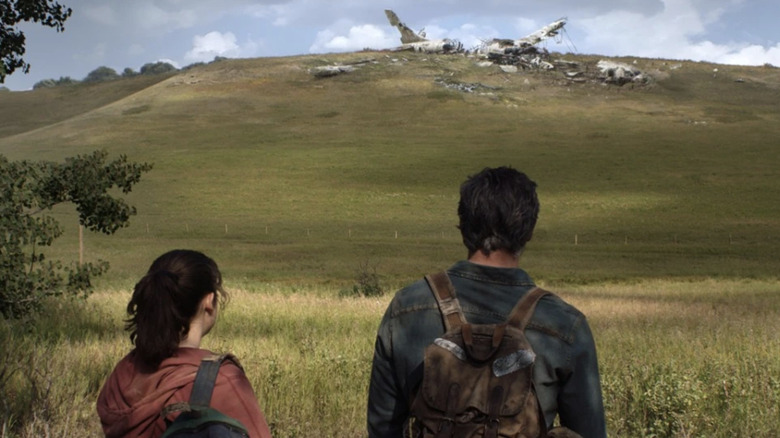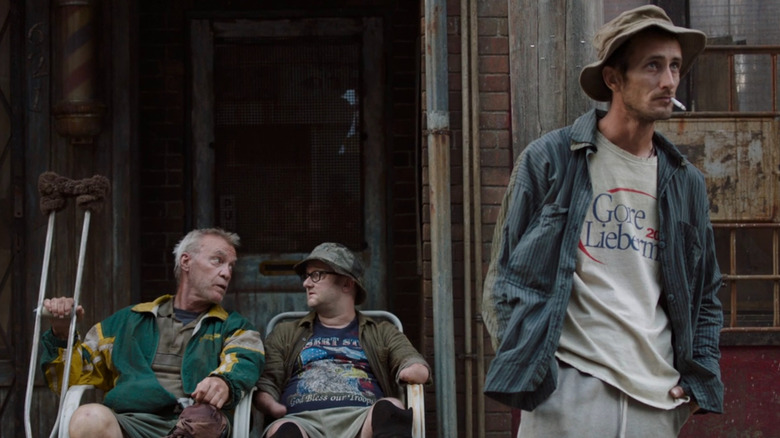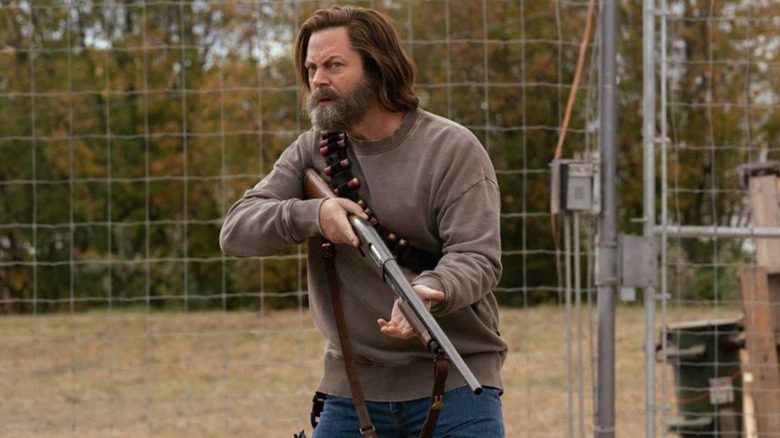How A Critical Timeline Change Enhances HBO's The Last Of Us
Creative liberties are almost always bound to happen with video game adaptations. For "The Last of Us," nearly every significant change made to the series at this point has only enhanced the game's story, characters, and post-apocalyptic world. While there have been several big changes, one of the most crucial is the timeline of events. In the original "The Last of Us" video game, the night of the outbreak is September 2013 (the same year the game came out). The main story would then take place 20 years later, in the 2030s from that point on, making this terrifying outbreak take place at a comfortable distance of time from game's first players.
"The Last of Us" television series co-creators Craig Mazin and Neil Druckmann decided to have the Cordyceps outbreak happen in 2003, 10 years earlier than in the video game. This shift allows Mazin and Druckmann to take the real-world insecurities and social climate of the early 2000s and enhance the story in unexpected and poignant ways. Whether examining the trauma caused by real-world tragedies through a science fiction lens or portraying paranoid characters, "The Last of Us" makes its timeline complement the themes of the series.
Putting things in a new perspective
It's easy at first glance to think nothing of the timeline change. My initial thoughts when watching the series was that it was done to coincide with the year of the show's release, 2023. However, certain aspects and lingering shots — the "Operation: Desert Storm" combat veteran sticker on Tommy's truck, a random resident wearing a Gore/Lieberman campaign shirt in the Boston QZ — began to form a new picture in my head. The crashing plane imagery halfway through the first episode reinforces my reasoning for why the TV series co-creators changed the timeline — "The Last of Us," like other movies and shows before it, takes the tragedies and social climate of the early 2000s, and uses them to its advantage when depicting the state of humanity in the U.S. after a global pandemic.
"The Last of Us" isn't the first to use the backdrop of its fictional story to make parallels to real-world fears and insecurities. A more recent example would be Bruce Wayne's anger and dialogue in "Batman v Superman," with one scene, in particular, being essentially a word-for-word quote from former vice president Dick Cheney after the 9/11 terrorist attacks. The effect 9/11 has had on pop culture throughout the years is palpable. And "The Last of Us" move to have the outbreak occur two years after 9/11 paints an entirely new perspective of the characters' fears before the outbreak as well as events that came after, such as FEDRA, the military dictatorship spawned from the remnants of the U.S. Government.
Exploring collective trauma and anxiety
The actions of FEDRA make even more sense in the context of the series' timeline. How quickly the government of the post-pandemic world turned militaristic was never a point of disbelief in the game. However, given the context of world events and what had preceded the Cordyceps outbreak in the show, it makes the quick and self-destructive turn of the government and its justifications for murder and totalitarianism even more convincing. The anxiety caused by the politics following the beginning of the decade also makes Bill's (Nick Offerman) apprehension towards the government in episode 3. The subtle political commentary doesn't affect the show's larger story. If anything, it feels more believable (especially Bill calling FEDRA soldiers "new world jackboot f****"). The paranoia of Offerman's character is reflective of the conspiracy theorists born out of the 2000s, as the 9/11 attacks created a deep distrust of the government. In Bill's case, his assumptions about their deadly intent were correct.
In addition to tackling the story beats and themes of the game, "The Last of Us" has also decided to explore new angles, and it's for the better. Aside from the emotional suffering Joel and Ellie go through in the story (which is empathetic in its own right), it also delves into collective trauma and anxiety evocative of the period and adds another frightening "what if" layer to the series for viewers — the possibility of another tragedy sparking the government to further strip away citizens' rights is as scary as a zombie outbreak. All of this may be a case of me looking too much into every detail, but I'd like to believe that this timeline change was done to enhance the show and its themes.


